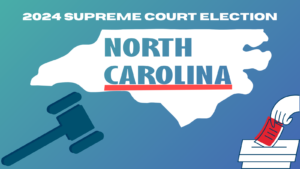2024 States to Watch: North Carolina

North Carolina Supreme Court Election
North Carolina elects their state supreme court justices by partisan election for eight-year terms. This means candidates appear with a party affiliation next to their name on the ballot. On November 5, one seat is up for election on the state supreme court. There are two candidates, one Democrat and one Republican, running for the seat. These justices will be in the partisan section of your ballot. Find a sample of your ballot here.
Who is running:
Incumbent Justice Allison Riggs (D) is running for election to a full term on the court. Riggs is being challenged by North Carolina Court of Appeals Judge Jefferson Griffin (R).
Prior to becoming a judge, Riggs spent her career fighting for the civil rights and voting rights of all North Carolinians at the Southern Coalition for Social Justice. She spent 14 years litigating cases at all levels from state courts to the U.S. Supreme Court. In 2022, Gov. Roy Cooper (D) appointed her to the North Carolina Court of Appeals. Then in 2023, Cooper elevated Riggs to fill the vacancy left by Justice Michael Morgan’s early retirement from the bench.
Griffin, Riggs’s opponent, was a Wake County prosecutor and proud to serve as a judge advocate general officer in the NC Army National Guard. As a prosecutor, he prosecuted criminal cases ranging from minor infractions to murder charges. Griffin joined the district court bench in 2015 after an appointment by Gov. Pat McCrory (R). He remained there until winning election to the statewide court of appeals in 2020.
The stakes:
The North Carolina Supreme Court has the final say on all your constitutional rights and freedoms, including any changes that the legislature or governor makes. The court has delivered key decisions impacting voting rights, education funding, utility prices, environmental protections, and more.
For example, did you know the North Carolina Supreme Court directly reviews any decisions, orders, or new rules created by the North Carolina Utilities Commission, which is the agency charged with reviewing and setting utility rates on consumers? In 2020, the court approved a rate hike within the mandatory fees that consumers had to pay, and then in 2022 the court eased the burden on consumers by lengthening the period that utilities providers could raise the rates. Earlier this year, the latest set of rate hikes were challenged before the state supreme court.
Last year the court made an unusual and unprecedented move. After previously ensuring every North Carolinian’s access to the ballot by overturning a gerrymandered congressional map and blocking a discriminatory voter ID law, the court—under a new majority just months after the original decision— decided to rehear those two cases. The new majority reversed itself, meaning it approved the gerrymandered maps and voter ID law. This unprecedented reversal within months of delivering the original decision demonstrates the court’s immense impact and importance.
The court is also set to rehear cases that will impact decisions it made in 2022 under a different majority. The court will redefine its definition of what every child’s access to a sound and basic education actually looks like. The court previously mandated the state legislature fulfill funding gaps across school districts to ensure equal treatment in education. Now, that mandate is being challenged again. This means $1.75 billion may not end up going towards children’s education depending on the court’s decision.
What’s next:
Every single voter in North Carolina has a say on who sits on their state’s highest court. This means each person is charged with deciding the fate of public education, LGBTQ+ rights, access to the ballot, utility prices, and more.

